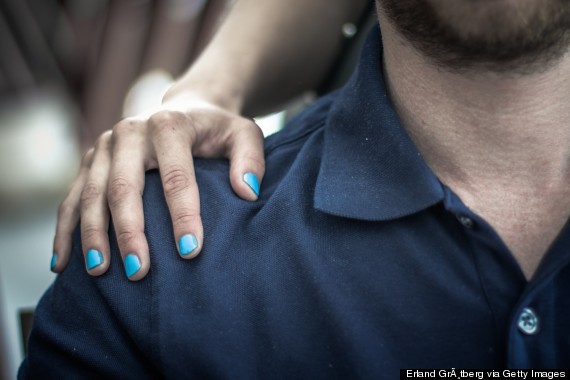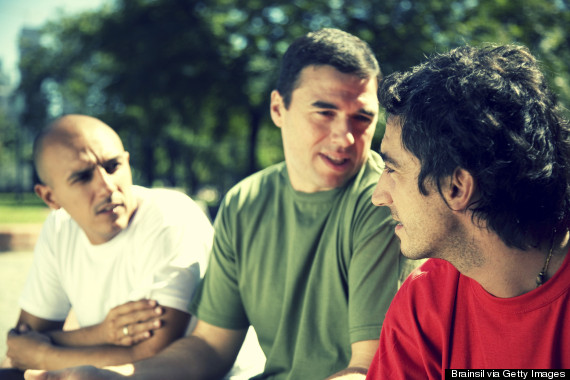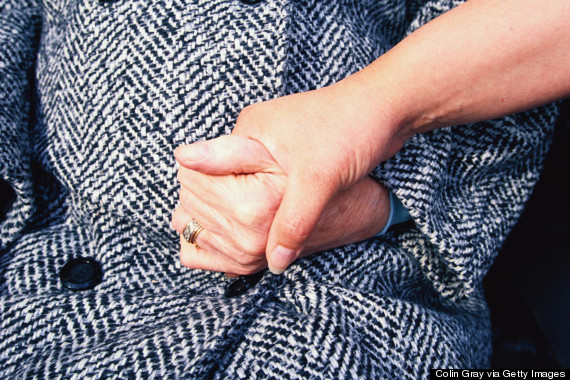Picture this: You're going about your normal routine, whether it be cleaning the bathroom, doing dinner or getting ready for work. Perhaps you're packing for a trip or getting ready to grab the train. You're calm. But then the next moment, you're completely swallowed by a feeling of dread.
For those who have had the terrifying misfortune of experiencing panic attacks, these emotions are an all-too-familiar reality. And when one of these episodes happens, sometimes the responses from friends and loved ones can be more hurtful than helpful.
It can be frustrating and scary when someone you care about is navigating panic. However, there are ways to not be totally helpless during the situation. Below is a guide of behaviors and phrases you shouldn't use with someone in the middle of a panic attack -- and what to do instead.
DON'T: Tell them to "calm down."
When it comes to things not to say, this phrase is probably at the top of the list. In fact, telling someone to "calm down" or "relax" may prompt the opposite to happen, according to Scott Bea, a clinical psychologist and assistant professor of medicine at the Cleveland Clinic. "Anxiety can be like quicksand -- the more you do to try to diffuse the situation immediately, the deeper you sink," he previously told HuffPost Healthy Living. "By telling people things like 'stay calm,' they can actually increase their sense of panic."
DO: Offer a supportive statement like "I'm here for you."
A little gentle encouragement can go a long way. "If you really want to help somebody, then the way you should go about it is to ask yourself if you can be supportive of the individual in a way that allows them to tell you about what they're experiencing and why they may be experiencing that," Todd Farchione, Ph.D., a clinical psychologist at the Center for Anxiety and Related Disorders at Boston University, said. Saying things like "suck it up" or telling them they have nothing to worry about can be incredibly invalidating, which can then aggravate their panic. Try one of these supportive phrases instead.
DON'T: Freak out over the episode.
According to Farchione, getting upset over your loved one's anxiety -- or "being panicky about their panic," he said -- may make the situation worse. "The worst thing you could do is to panic and contribute to the high level of emotion that's already occurring," Farchione explained. "That's adding fuel to the fire and can take the form of lacking compassion for what they're experiencing."
DO: Listen to what they need.
Before you act on your instincts, pay attention to the sufferer's cues. They know their own anxiety better than anyone. "Take your direction from the person themselves instead of of going on the assumption of what they may need from you," Allison Baker, M.D., a child and adolescent psychiatrist and director of the adolescent program for Columbia University Medical Center, told HuffPost. Panic attacks feel different to each person. As a result, what they need in that moment -- whether it be a glass of water or just a shoulder to lean on -- will be different too.
Bottom line: Be empathetic.
When it comes down to it, put yourself in the sufferer's shoes, Baker said. We've all experienced anxiety in some form or another, so imagine having those feelings amplified. By being empathetic, you're showing them that they don't have to fight to validate what they're feeling -- and as a result, they may start to let go of their panic.
As author and researcher Brene Brown explains in a video on empathy, the emotion is more powerful than we think when it comes to human interaction. "Empathy fuels connection," she said. "One of the things we do sometimes in the face of very difficult conversations is we try to make things better. If I share something with you that's very difficult, I'd rather you say, 'I don't even know what to say. I'm just so glad you told me.' Because the truth is, rarely can a response make something better. What makes something better is connection."
Do you suffer from panic attacks? What do you wish loved ones knew about your experience? Let us know in the comments below.
Have a story about anxiety or panic attacks that you'd like to share? Email strongertogether@huffingtonpost.com, or give us a call at (860) 348-3376, and you can record your story in your own words. Please be sure to include your name and phone number.
Need help? In the U.S., call 1-800-273-8255 for the National Suicide Prevention Lifeline.